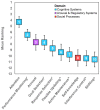Building a transdisciplinary expert consensus on the cognitive drivers of performance under pressure: An international multi-panel Delphi study
- PMID: 36755983
- PMCID: PMC9901503
- DOI: 10.3389/fpsyg.2022.1017675
Building a transdisciplinary expert consensus on the cognitive drivers of performance under pressure: An international multi-panel Delphi study
Erratum in
-
Erratum: Building a transdisciplinary expert consensus on the cognitive drivers of performance under pressure: an international multi-panel Delphi study.Front Psychol. 2023 Jun 20;14:1236133. doi: 10.3389/fpsyg.2023.1236133. eCollection 2023. Front Psychol. 2023. PMID: 37408971 Free PMC article.
Abstract
Introduction: The ability to perform optimally under pressure is critical across many occupations, including the military, first responders, and competitive sport. Despite recognition that such performance depends on a range of cognitive factors, how common these factors are across performance domains remains unclear. The current study sought to integrate existing knowledge in the performance field in the form of a transdisciplinary expert consensus on the cognitive mechanisms that underlie performance under pressure.
Methods: International experts were recruited from four performance domains [(i) Defense; (ii) Competitive Sport; (iii) Civilian High-stakes; and (iv) Performance Neuroscience]. Experts rated constructs from the Research Domain Criteria (RDoC) framework (and several expert-suggested constructs) across successive rounds, until all constructs reached consensus for inclusion or were eliminated. Finally, included constructs were ranked for their relative importance.
Results: Sixty-eight experts completed the first Delphi round, with 94% of experts retained by the end of the Delphi process. The following 10 constructs reached consensus across all four panels (in order of overall ranking): (1) Attention; (2) Cognitive Control-Performance Monitoring; (3) Arousal and Regulatory Systems-Arousal; (4) Cognitive Control-Goal Selection, Updating, Representation, and Maintenance; (5) Cognitive Control-Response Selection and Inhibition/Suppression; (6) Working memory-Flexible Updating; (7) Working memory-Active Maintenance; (8) Perception and Understanding of Self-Self-knowledge; (9) Working memory-Interference Control, and (10) Expert-suggested-Shifting.
Discussion: Our results identify a set of transdisciplinary neuroscience-informed constructs, validated through expert consensus. This expert consensus is critical to standardizing cognitive assessment and informing mechanism-targeted interventions in the broader field of human performance optimization.
Keywords: assessment; cognition; expert consensus; high performance; transdisciplinary.
Copyright © 2023 Albertella, Kirkham, Adler, Crampton, Drummond, Fogarty, Gross, Zaichkowsky, Andersen, Bartone, Boga, Bond, Brunyé, Campbell, Ciobanu, Clark, Crane, Dietrich, Doty, Driskell, Fahsing, Fiore, Flin, Funke, Gatt, Hancock, Harper, Heathcote, Heaton, Helsen, Hussey, Jackson, Khemlani, Killgore, Kleitman, Lane, Loft, MacMahon, Marcora, McKenna, Meijen, Moulton, Moyle, Nalivaiko, O’Connor, O’Conor, Patton, Piccolo, Ruiz, Schücker, Smith, Smith, Sobrino, Stetz, Stewart, Taylor, Tucker, van Stralen, Vickers, Visser, Walker, Wiggins, Williams, Wong, Aidman and Yücel.
Conflict of interest statement
VM was employed by Mindflex Group Ltd. JG is a stockholder in MAP Biotech Pty Ltd. SC has received speakers fees Janssen-Cilag Australia, Lundbeck Otsuka Australia, Servier Australia; Investigator Initiated research funding Janssen-Cilag Australia; Lundbeck Otsuka Australia; Advisory Boards Lundbeck Otsuka Australia. AT has received research funding from BHP, Rio Tinto, and Shell. SD is a Member of the Board of Advisors Eisai Australia Pty Ltd. MY has received payments in relation to court-, expert witness-, and/or expert review-reports. JD was employed by Florida Maxima Corporation. The remaining authors declare that the research was conducted in the absence of any commercial or financial relationships that could be construed as a potential conflict of interest.
Figures


References
-
- Barrett L. F., Gross J., Christensen T. C., Benvenuto M. (2001). Knowing what you're feeling and knowing what to do about it: mapping the relation between emotion differentiation and emotion regulation. Cognit. Emot. 15, 713–724. doi: 10.1080/02699930143000239 - DOI
LinkOut - more resources
Full Text Sources

